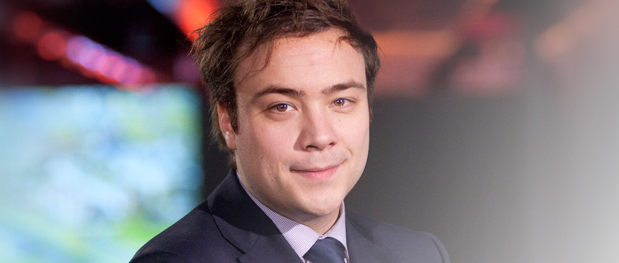Danny Mekić (1987) is a born entrepreneur. He started his first internet company at the age of 15. After winning a number of awards in 2009, he started appearing in the media more and more often. This caused him to end up in the phone books of the ‘éminence grise’, who invited him to all sorts of inspirational and strategic meets.
His personal passion is about two types of companies. Firstly, there are the large oil tankers. They need to keep going ahead, because everyone expects them to. But they can have trouble with that, because it’s difficult for them to alter their course in times when the waves are very changeable. His other passion is in encouraging entrepreneurship. Hence, his second company is an investment company that focuses on startups. He’s looking for ‘disturbing innovations’, ideas that could challenge the establishment and that show that things could be done entirely differently and much better. They often don’t have enough money to be interesting to a bank.
By now he’s ready for his third company, NewTeam. It’s a consultancy firm staffed by teenagers and people in their twenties. At the moment they’re employed by 40 of the 100 largest organisations in the Netherlands. Their goal is to change organisations from inside, to challenge them and improve them in the areas of technology, media, communication, entrepreneurship and law. The idea of the company is to first look for good people, instead of pushing your proposition on your clients. The difference between them and other firms is that their advice doesn’t automatically come with a proposal to take care of it themselves. And that’s exactly what makes them trustworthy.
What are Danny Mekić’s thoughts on notions like trust, transparency and authenticity? We went to his office in Amsterdam to ask.
Trust
In the past, there were small banks, small insurance companies, small bakeries, small stores. In the past few decades, companies have grown tremendously. You can see that to accommodate for this larger scale, large organisations have started ignoring individuality. People believed that at a larger scale, it would be necessary to have one central point of contact for all the customers. And that only works if you nullify individual freedom. For example, if you call the help desk of your phone provider and ask a perfectly sensible question, you’ll be told that it’s impossible. If you then ask why it’s impossible, they’ll tell you it’s impossible because it doesn’t fit into the system. In recent years we’ve seen that, due to the crisis (which it would honestly be better to call a turning point), large organisations have been trying to save money on service and customer relations. After all, all the other large organisations are doing it too. Aside from that, due to digitalisation, companies are challenged by a new type of startup that takes an entirely different approach. These startups are able to revive the values of the small town bakery.
Moreover, a sort of trap has been created by consumers finding each other on social media and comparison sites. With individuals collecting small bits of information and being connected to one another via the internet, you’ll get a reliable idea of how an organisation works in practice. Consumers are finding out that their trust in organisations is less well-deserved than they thought. That leads to decreasing trust. This is made worse still by the aftershocks of several industries where all sorts of scandals have come to light. Think for example of politics, financial institutions or the retail sector.
Organisations will therefore need to change in order to be able to regain people’s trust. That starts with being honest to yourself. What do we really do? Do we really treat our customers well? Can we satisfy them? If that’s not feasible, you should do something else. Investments are retroactively being made in customer satisfaction, but companies rarely ask themselves whether they as an organisation really deserve to be trusted. What’s striking is that in the people in the various board rooms often say the same things as their competitors. If you ask them why customers choose them, the answer is almost always: ‘we provide good service.’ And ‘good service’ is then defined as ‘slightly less awful than the competitor’s’. So when it comes to trust, organisations convince themselves that it’s all not so bad. When the employees at the help desk are only allowed to say ‘no’, then there may be a service channel, but customer satisfaction is still zero (as is the motivation of the help desk workers). Trust is therefore something organisations need to build up again. It’s not just about a trustworthy demeanour; people need to feel it. Trust exists in relation to the other person.
Transparency
Transparency used to be something a company could grant. Nowadays, it’s something that happens to them. They are less and less in control of it themselves. The consumer’s consciousness and knowledge has grown enormously in recent years, as a result of the rise of the internet. In order to be able to retain the consumer’s trust, organisations should not resist this transparency.
If your organisation doesn’t offer transparency itself, someone else will do it for you. And that almost always has negative consequences. For example, the Dutch government is not known for having the most innovative approach. We often read news reports about failed IT projects. However, that’s not how things really are. There’s a great amount of innovation within the Dutch government. But they’re not transparent about it. The media fill in the blanks left by that vagueness. The government would therefore do better to make those innovations publicly known and let people discuss them. This can lead to good suggestions for improvement. That’s why for organisations, the question comes back to: how well are we really doing? If you claim for example that you offer the best vacations, with the best air travel, the best hotels, the best service and also the lowest price, you’ll have to deliver on that promise. But that’s often not possible, because that combination doesn’t exist. That’s when organisations are caught in a lie.
In some situations, however, transparency is unnecessary, or even undesirable. When an airline company never has any accidents, you don’t ask about the maintenance of their aircraft. Or when an asset management company yields a twenty percent return year after year, you don’t ask how they do it. In that situation, you want transparency in another area: what’s the price for getting to work with you? Basically, the use of transparency is mostly to compensate where trust is lacking. This goes both ways. When there’s one hundred percent trust, people won’t require transparency. And vice versa: when there’s no trust, people will demand one hundred percent transparency.

















